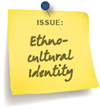Ethno-cultural Identity
Pre Course Reading for CALD 9
eCALD Supplementary Resources

Individuals may differ in the extent to which they identify with and endorse their own cultural traditions.
Cultural identity holds great meaning to a person. If the clinician is to develop a sound cultural formulation of the client’s presenting complaints, the depth of their cultural identity needs to be ascertained.
The implication is that ethnicity is not as important when understanding perspectives and explanations as the degree to which a person identifies with the beliefs and practices of a group.
For migrants and groups that are subject to additional (and sometimes multiple) cultural influences, there can be significant variation in the extent to which they identify with traditional cultural values. Some migrant clients may be bicultural in their degree of acculturation, others may be fully acculturated and some may maintain a strong traditional identification. It is particularly important to ascertain cultural identity when evaluating cultural aspects of mental illness and when using Western standards for assessment, diagnosis and treatment. The DSM V gives cultural identity priority in the guidelines for cultural formulation (APA, 2013b; 2013c)
Ton and Lim (2006) also note how advantageous it is to establish cultural identity in a clinical assessment. It not only identifies sources of strength and support that are useful in treatment but also identifies potential sources of cultural conflict.
By enquiring about the whole person (and not just about the illness), a deeper understanding of the client’s world view can be gained and thereby a greater rapport can be developed.
